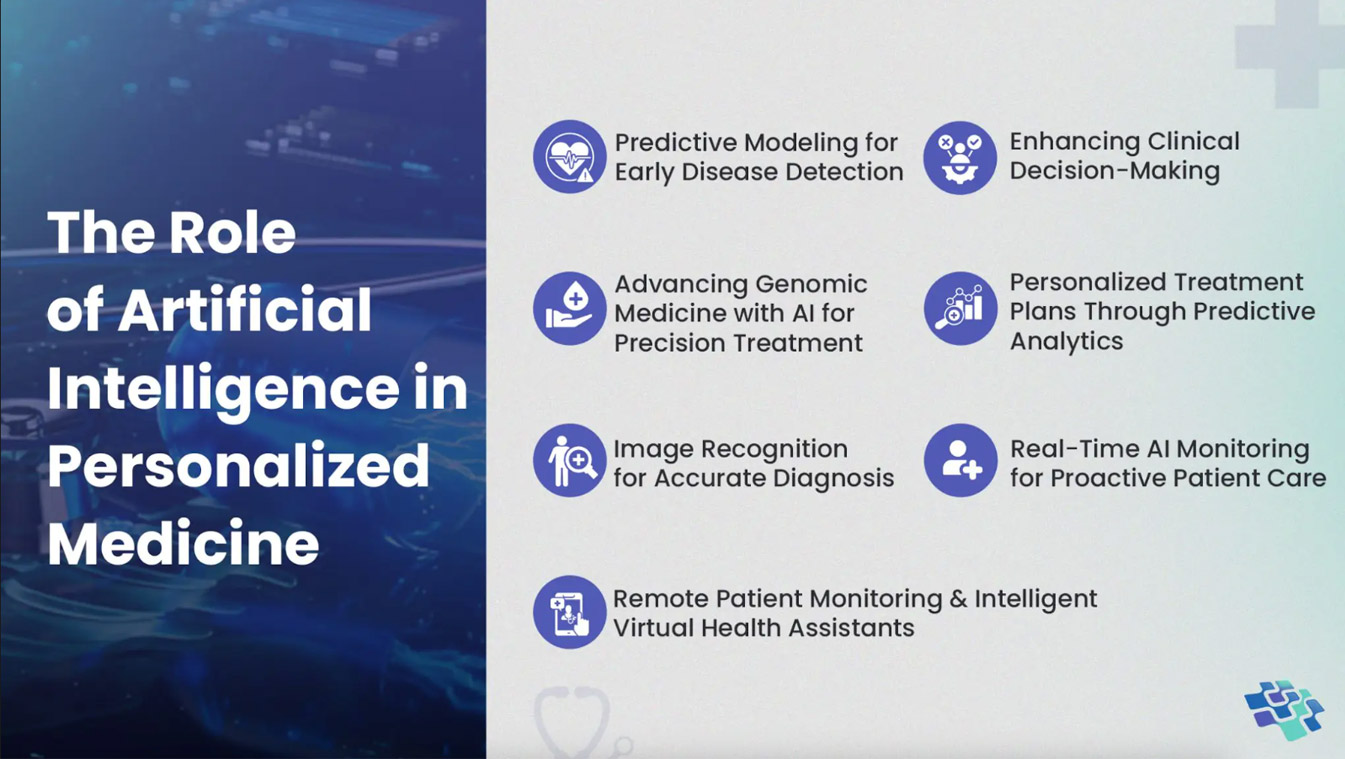AI in Personalized Medicine: Solving Delayed Diagnoses for Better Patient Outcomes
To progress the application of AI in the delivery of customized medicine and, eventually, improve the lives of patients globally, cooperation between technologists, doctors, academics, and regulators is essential.
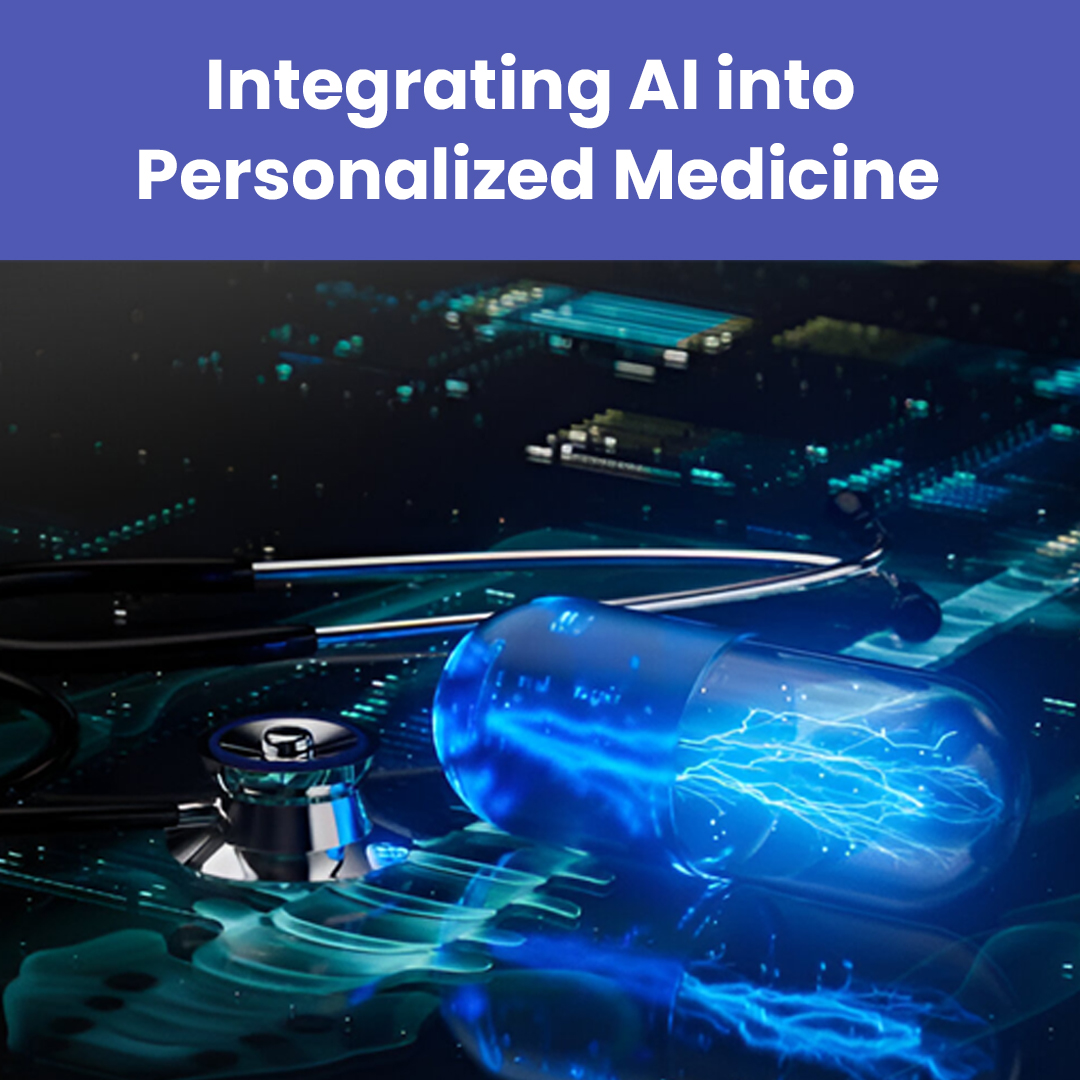
Overcoming Healthcare Data Fragmentation? Our Digital Health Software Ensures Seamless, Integrated Patient Management for Better Decisions
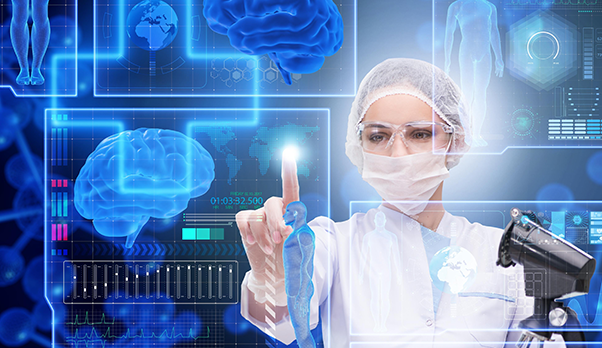
“The problem that AI in personalized medicine aims to solve is the challenge of analyzing copious amounts of data to develop personalized treatment plans. Traditional personalized medicine approaches have limitations due to the complexity of analyzing the vast amounts of data involved in creating a personalized treatment plan. However, utilizing AI to find patterns and correlations in data can assist in overcoming these constraints, which can then be utilized to generate more accurate and successful personalized treatment regimens.”- NCBI
Role of AI in Personalized Medicine
Precision medicine and artificial intelligence together hold the potential to transform healthcare by enabling highly individualized care. Precision medicine identifies patients with unique health profiles or atypical therapeutic responses through the integration of genetic, clinical, and lifestyle data. AI enhances this process by leveraging advanced algorithms and computational power to uncover complex patterns, generating insights that improve clinical decision-making at a scale. Recent studies emphasize that translational research combining genomic and nongenomic factors, such as symptoms, medical history, and lifestyle, can enable more accurate diagnoses and prognoses tailored to each patient. This integrative approach addresses key challenges in precision medicine and accelerates its clinical impact.
In practice, precision medicine aligns with an organization’s workflow by assigning appropriate tasks across clinical staff. Routine responsibilities may be handled by nurses, medical assistants, or front desk personnel, while complex, data-driven insights are escalated to providers, ensuring that the right care decisions are made by the right individuals at the right time.
AI-Driven Diagnostics: Revolutionizing Disease Detection & Diagnosis
Effective treatment is based on a fast and accurate diagnosis. By improving medical practitioners’ skills and lowering diagnostic errors, artificial intelligence is transforming the detection and diagnosis of disease. Doctors can examine patient data, spot minor patterns, and spot early disease symptoms because of AI systems. For example, AI can examine medical imaging, like MRIs and X-rays, to find anomalies that the human eye could miss. Moreover, AI-driven diagnostic technologies can optimize surgical results by offering real-time analysis and suggestions during procedures.
Healthcare professionals can identify high-risk individuals and put preventive measures in place to slow the spread of disease because of AI’s capacity to process and analyze vast datasets and create predictive models.
Apply the Power of AI in Medicine & Healthcare
Digital health software development services are enabling individualized medicine that are transforming the healthcare industry. AI algorithms can analyze enormous volumes of patient data, including genetic information, medical history, lifestyle factors, and real-time data, to:
- Predict Disease Risks: AI predicts individual disease risks by analyzing genetic, clinical, and lifestyle data, enabling early intervention and preventive care. For example, AI can identify patients at substantial risk for type 2 diabetes, prompting lifestyle changes or monitoring before symptoms appear.
- Enable Precision Medicine: AI enables precision medicine by matching treatments to a patient’s unique genetic and clinical profile, enhancing effectiveness and reducing side effects. For instance, AI can recommend the most suitable cancer therapy based on a tumor’s genetic mutations and patient history.
- Optimize Treatment Plans: Artificial intelligence in personalized medicine optimizes treatment plans by tailoring therapies to each patient’s genetics, health history, and lifestyle, improving outcomes and minimizing side effects. For example, AI can personalize asthma management by adjusting medication types and dosages based on patient-specific triggers and responses.
- Enhance Patient Engagement: AI-powered virtual health assistants enhance patient engagement by delivering personalized education, reminders, and real-time support. For example, a virtual assistant can guide a diabetic patient with daily glucose tracking, meal suggestions, and medication reminders, fostering better self-management and adherence.
- Accelerate Drug Discovery: AI in personalized medicine accelerates drug discovery by identifying potential targets and predicting compound effectiveness, significantly reducing research time and cost. For example, AI algorithms have helped uncover new protein targets for Alzheimer’s, speeding up the development of promising therapeutic candidates.
- Assisting Patients in Navigating the Healthcare “Maze”: AI simplifies healthcare navigation by providing personalized insights into a patient’s health plan, such as flagging when prior authorization is needed or confirming in-network referrals.
Challenges & Ethical Considerations
While AI in personalized medicine offers transformative potential, it raises challenges and ethical concerns. Maintaining an audit trail of AI-driven insights enables transparency, supports evidence-based decisions, and allows for continuous refinement of algorithms to ensure accuracy, fairness, and trust.
- Data Privacy: Data security and privacy are issues since AI needs access to enormous personal health data. To protect sensitive data, safeguards must be in place.
- Bias: If the training data is not diverse, biased algorithms may continue to perpetuate health inequities. To avoid discrimination, it is essential to make sure AI models are trained on representative datasets.
- Regulation: To ensure the safety, accuracy, and moral use of AI technologies, extensive restrictions are required due to the quick integration of AI into healthcare.
- Interoperability: It might be difficult to smoothly integrate AI solutions in healthcare since data sources and systems frequently lack interoperability.
Dealing With Gaps in Patient Monitoring? AI Healthcare Software Provide Continuous, Real-Time Health Insights
Revolutionizing Patient Care: The Impact of Artificial Intelligence in Personalized Medicine
AI is pivotal in advancing personalized healthcare by leveraging machine learning and data analytics to interpret complex datasets—genomic, clinical, and behavioral—enabling precise, patient-specific interventions, early diagnostics, and optimized treatment pathways that significantly enhance outcomes and clinical efficiency.
1. Predictive Modeling for Early Disease Detection
AI-powered predictive modeling is transforming early disease detection by analyzing a patient’s genetic profile, lifestyle factors, and medical history to assess individual risk levels. Advanced machine learning algorithms can detect subtle anomalies in longitudinal health data, often imperceptible to clinicians, that may indicate early signs of disease onset. By identifying these deviations early, AI enables proactive, evidence-based interventions, improving prognosis and reducing treatment complexity.
For instance, AI models can predict the likelihood of cardiovascular disease by analyzing cholesterol levels, family history, and wearable device data. This allows clinicians to recommend preventive measures such as lifestyle changes or early medication, significantly enhancing patient outcomes and reducing long-term healthcare costs.
2. Enhancing Clinical Decision-Making
AI-powered clinical decision support system software solutions can enhance clinical decision-making by integrating real-time patient data with medical literature, treatment guidelines, and predictive analytics. These systems offer evidence-based recommendations, assisting physicians in selecting the most effective, personalized interventions while minimizing risks. By continuously learning from new data, AI-driven CDSS improves diagnostic accuracy and treatment precision.
An AI model used in oncology demonstrated a 30% improvement in treatment plan alignment with expert recommendations by analyzing tumor genetics, patient history, and response patterns. Such systems streamline workflows, reduce human error, and ensure consistency in care delivery, empowering clinicians to make more confident, data-driven decisions tailored to each patient’s unique medical profile.
3. Remote Patient Monitoring & Intelligent Virtual Health Assistants
AI in remote patient monitoring leverages wearable devices and IoT sensors to collect real-time physiological data, such as heart rate, glucose levels, and sleep patterns, enabling continuous oversight of patient health outside clinical settings. Advanced AI algorithms analyze this data to detect anomalies, predict health deteriorations, and trigger alerts for timely interventions.
Integrated with telemedicine platforms, intelligent virtual health assistants offer personalized support, medication reminders, and lifestyle recommendations based on ongoing health trends. AI-enabled software development enhances these by ensuring secure, scalable, and interoperable solutions tailored to specific clinical workflows. This synergy improves patient engagement, reduces hospital readmissions, and expands access to quality care, especially for those in remote or underserved areas.
4. Advancing Genomic Medicine with AI for Precision Treatment
Artificial intelligence is transforming genomic medicine by rapidly analyzing complex genomic sequences to identify disease-associated variants with high accuracy. This enables early detection of hereditary conditions and supports the development of precision treatment strategies tailored to an individual’s genetic profile.
AI algorithms are actively used in oncology to detect mutations linked to specific cancer types, guiding targeted therapies. This integration accelerates diagnosis, enhances treatment efficacy, and represents a critical advancement in the delivery of personalized, genomics-driven healthcare.
5. Personalized Treatment Plans Through Predictive Analytics
AI-driven predictive analytics is revolutionizing personalized treatment planning by leveraging electronic health records, lifestyle data, and environmental exposures to forecast individual health trajectories. Through advanced machine learning models, it identifies high-risk patients, predicts disease progression, and estimates readmission probabilities. These insights allow clinicians to develop proactive, patient-specific interventions aimed at preventing complications and optimizing outcomes. Personalized AI-powered chatbots further enhance engagement by offering tailored health advice, medication reminders, and appointment scheduling.
Predictive models in chronic care management can identify patients likely to experience acute exacerbations, enabling timely adjustments to care plans and reducing emergency visits or hospitalizations.
6. Image Recognition for Accurate Diagnosis
AI algorithms, particularly deep learning models, have significantly advanced the field of medical imaging by enabling high-precision analysis of radiological data such as X-rays, CT scans, and MRIs. These models are trained on vast datasets, allowing them to detect subtle patterns and anomalies, such as microcalcifications or early tumor formations, that may be overlooked by human interpretation. By correlating imaging findings with patient-specific clinical data and outcomes, AI enhances diagnostic accuracy and supports the development of personalized treatment strategies.
AI-assisted detection of early-stage breast cancer can lead to prompt intervention and tailored therapies, improving survival rates and reducing overtreatment through precision targeting of disease-specific features.
7. Real-time AI Monitoring for Proactive Patient Care
Real-time AI monitoring empowers proactive patient care by continuously analyzing physiological data from wearable sensors and IoT-enabled devices. These technologies capture vital signs, activity levels, sleep quality, and other biometrics in real time. AI algorithms process this data to detect deviations from individualized baseline patterns, identify early warning signs of health deterioration, and predict potential adverse events. Alerts are automatically generated for clinicians, enabling timely interventions and reducing the risk of complications.
AI models integrated with cardiac monitors can predict arrhythmias or heart failure exacerbations before symptoms manifest. This approach not only enhances patient safety and care continuity but also supports a shift from reactive to preventive healthcare, especially for chronic disease management and post-acute monitoring.
Facing Ineffective Treatments? AI-Powered Tools Can Tailor Personalized Therapies for Better Patient Outcomes
A Future Fueled by Technological Innovations
Artificial Intelligence is poised to redefine the future of healthcare by enabling earlier disease detection, enhancing diagnostic precision, and optimizing treatment recommendations, improving patient outcomes and reducing costs. AI-driven systems can continuously monitor patients through wearables and analyze complex datasets to deliver real-time, personalized insights. While ethical and privacy concerns must be addressed through robust frameworks, the transformative potential of AI is undeniable.
As the technology matures, AI will become a foundational tool in clinical workflows, facilitating proactive, data-driven, and cost-effective care. This evolution marks a shift toward more intelligent, accessible, and patient-centric healthcare powered by continuous technological innovation.
There is No Precision Medicine Without Artificial Intelligence
Precision medicine is a transformative approach to disease prevention and treatment that considers individual genetic profiles, environmental exposures, and lifestyle factors. By tailoring care to each patient, it enables more accurate predictions of which therapies will be most effective for specific populations.
- Implementing precision medicine requires advanced computational resources and self-learning algorithms, such as deep learning, to process vast and complex biomedical data.
- These AI-powered models have already demonstrated diagnostic capabilities comparable to physicians in fields like cardiology, dermatology, and oncology.
Importantly, the most effective outcomes arise from the synergy between artificial intelligence and clinical expertise.
For example, in the International Symposium on Biomedical Imaging, an AI model achieved a 92.5% accuracy in detecting metastatic breast cancer from biopsy images. A human pathologist alone reached 96.6%, but when both AI and the pathologist’s inputs were combined, accuracy increased to 99.5%—cutting human error by 85%. This highlights AI’s role as a powerful tool to augment, not replace, human decision-making.
Conclusion
AI in personalized medicine is enabling early disease detection, optimizing treatment plans, advancing genomic analysis, and supporting real-time patient monitoring. The integration of AI in healthcare not only enhances diagnostic accuracy but also drives proactive, data-driven clinical decisions that improve patient outcomes and reduce overall healthcare costs.
To fully leverage this potential, healthcare organizations need tailored digital solutions. NextGen Invent’s AI healthcare mobile app development services and digital health software development services are designed to address critical pain points such as fragmented data, delayed diagnoses, and patient engagement gaps. From building intelligent clinical support software to crafting HIPAA-compliant telemedicine platforms, we help you deliver precise, scalable, and patient-centric care. Let us empower your healthcare journey with AI-driven innovation.
Frequently Asked Questions About AI in Personalized Medicine
Related Blogs
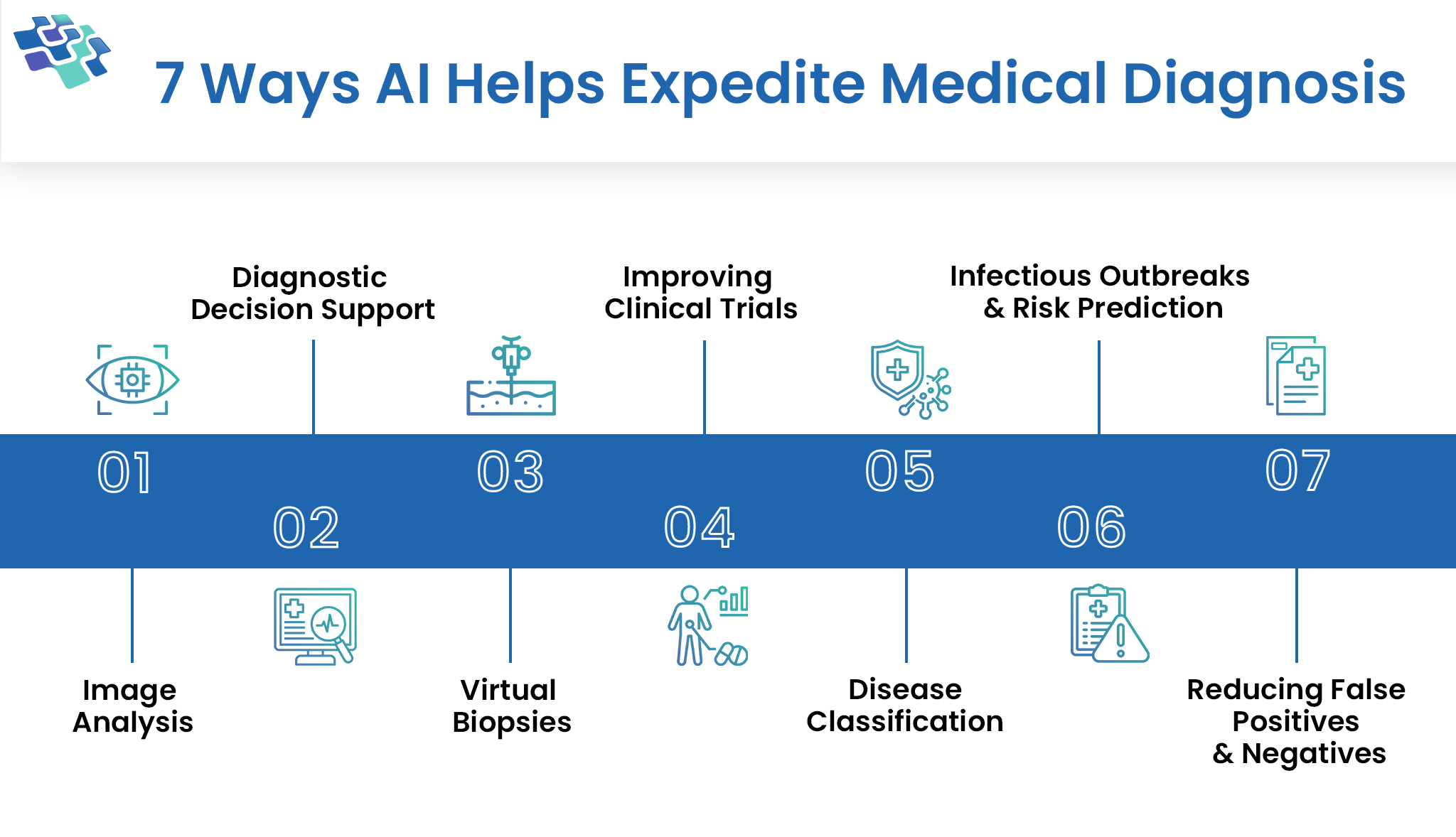
How Does AI in Medical Diagnosis Expedite It?
Medical imaging, including CT scans and X-rays, can be accurately analyzed by AI-powered systems, eliminating the need for human interpretation. Faster diagnosis and more successful treatment regimens can result from this.
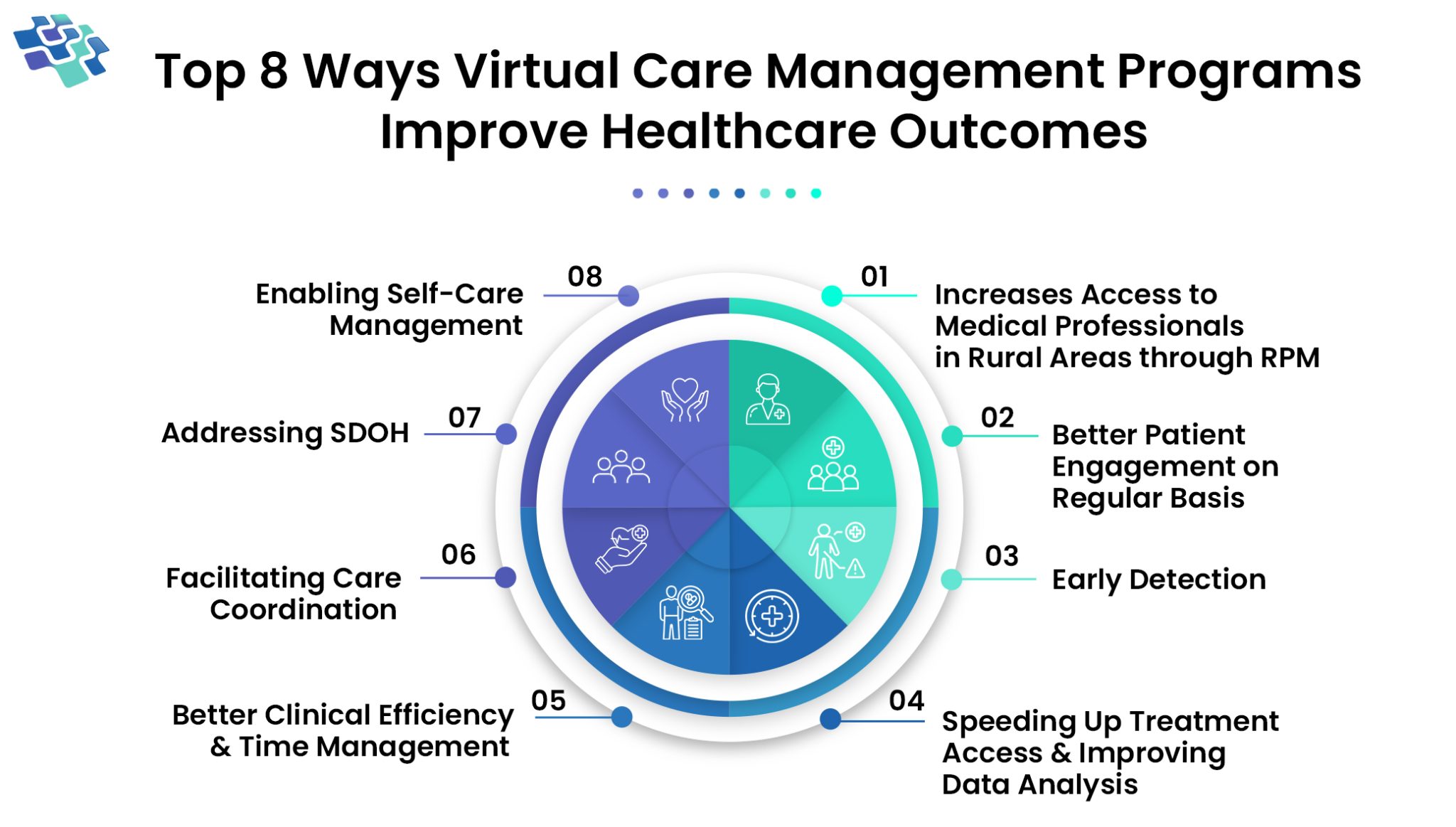
How Virtual Care Management Programs Improve Patient Wellness?
Virtual health is becoming increasingly popular. It is becoming essential for identifying and treating illnesses and for assisting customers in maintaining and enhancing their well-being. Are you curious about the future of virtual health and what it entails?
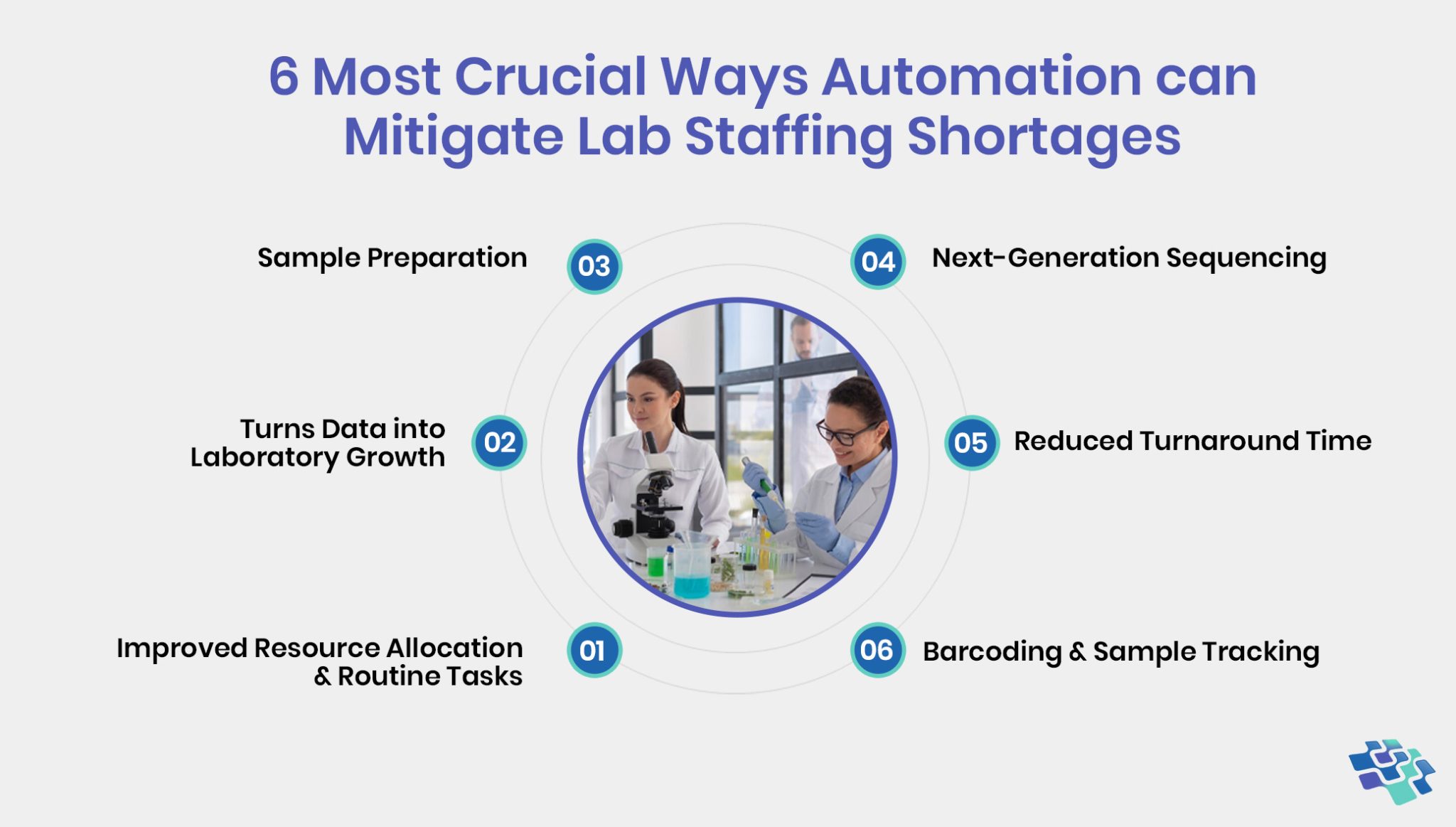
Struggling with Staffing Shortages? Discover How Lab Automation Can Solve the Crisis!
The lack of lab personnel has been an issue for many years and has now reached a critical stage. An estimated 20,000 to 25,000 laboratory technologists are needed nationwide, with vacancy rates as high as 25% in some US regions.
Stay In the Know
Get Latest updates and industry insights every month.
